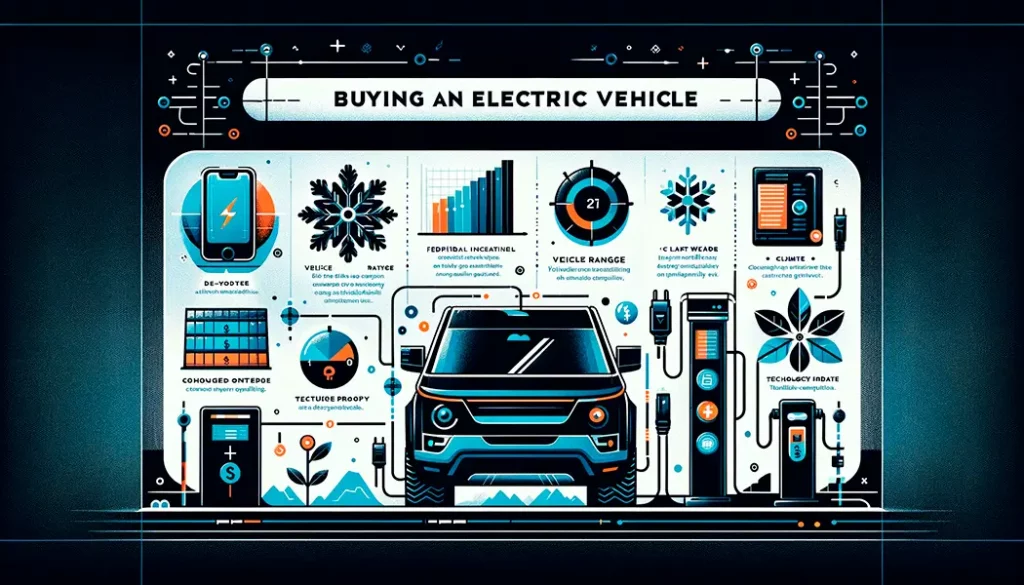So, you’re thinking about getting an electric vehicle (EV)? It’s a big step, sure, but also an exciting one. EVs are on the rise, offering a cleaner, more sustainable way to get around.
Before you jump in, there are a few key things you should consider to make sure you’re making the right choice. Let’s break it down into four main areas you need to think about.

Top 4 Essential Factors to Consider Before Buying an EV (PDF)
1. Planning Your EV Charging Strategy
Let’s dive into one of the most important aspects of EV ownership: where and how you’ll charge your vehicle. If you’re someone with easy access to a driveway or personal garage, consider yourself ahead of the game.
Installing a Level 2 charger at home means you can charge your car overnight, ensuring a full battery by morning. However, for those living in apartments or without private parking, the situation requires more planning.
Public charging stations are your go-to, but here’s where it gets a bit tricky. The availability and speed of these chargers vary greatly. While Level 3 chargers offer a quick power-up, they’re not as widespread as we’d like, and your EV’s compatibility with them is another consideration.
Not every electric car can handle the fastest charging options out there, so you’ll need to research what works best for your specific model. This step is crucial for anyone relying on public infrastructure to keep their EV running smoothly.
2. Understanding Federal Tax Incentives and Rebates
The government offers tax incentives to make EVs more affordable, but they can be a bit tricky to understand. These incentives change often, so you need to check the latest rules. As of now, you can get a decent chunk of money back when you buy an EV, but only if your car and its battery meet certain criteria.
For example, the car needs to be made in North America, and there are price caps based on the type of vehicle. Make sure the EV you’re eyeing is eligible for these incentives to get the best deal.
3. Assessing EV Range and Battery Life in Your Climate
Range is a big deal. It’s how far you can go on a single charge. Most new EVs have a range that’s more than enough for daily use, but cold weather can cut that range down. If you live somewhere chilly, you might find your car doesn’t go as far in the winter.
That’s something to keep in mind, especially if you don’t have easy access to charging. Make sure to pick an EV with a range that suits your lifestyle and consider how the climate might affect it.
4. Vehicle Compatibility and Future-Proofing
When selecting your electric vehicle, it’s essential to think about how it aligns with your current lifestyle and its readiness for the roads of tomorrow. The world of EVs evolves rapidly, with new advancements and updates emerging regularly. Opt for a vehicle that not only suits your needs today but is also equipped to adapt and grow with technological progress.
This means choosing an EV capable of over-the-air software updates, which can enhance its functionalities, efficiency, and even extend its lifespan without needing a physical visit to a service center.
Furthermore, the integration of technology in EVs is something to ponder. The shift towards digital controls—for everything from climate settings to navigation—marks a significant change from traditional vehicles.
If you’re someone who values tactile buttons and knobs, the transition to touchscreens might require an adjustment period. Therefore, ensure that you’re comfortable with the interface and usability of the EV’s technology.
After all, this vehicle is not just a mode of transport but a companion in your daily life, and its features should enhance, not complicate, your driving experience.
Conclusion: Is an EV Right for You?
Choosing an EV is about more than just the car; it’s about how it fits into your life. From where and how you’ll charge it, to making sure it’s a good financial move, to considering its range and how tech-savvy you are, there’s a lot to think about.
But if you do your homework and consider these four key factors, you’ll be in a great position to make the right choice. Ready to take the next step towards owning an EV?






